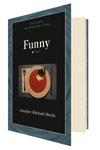
Here’s a good book of poetry that doubles as a book of jokes. Like this: “A gang of snails attacks a tree sloth, steals her wallet. / Down at the station, police chief / questions: How’d they get ya?” Sloth: “it all happened so fast.” This joke occurs almost halfway through a four-page poem, “The Propagation of the Species”: around it, Hecht arranges thoughts about the fiery doom of the solar system, the multiple uses of the word bananas, the pace at which we explain and review our own lives (“It is our autobiography / we are eating; you snooze you / lose”), and—what the whole poem settles down to ask—whether Hecht herself should bear a child.
Almost every poem here spins out from, or back into, a joke. From a three-part laugher about lost explorers, Hecht derives “A Little Mumba,” an Epicurean ode on the inevitability of death and the contradictions of anthropology: “in the end, friends / it’s either Mumba or death by Mumba, / so Mumba’s better.” (What’s a Mumba? You’ll see.) Hecht’s poems incorporate refrains, interlocking fuguelike motifs, twitchy allusions, and other structural devices common not to jokes but to step-by-step arguments or to classical music. Except in a few mock-Shakespearean (and subpar) sonnets, Hecht’s rhymes are irregular, gymnastic, pointed, and fun; she’s found what so many would-be populists seek, an idiom entirely conversational yet able to sustain unexpected ideas.
Hecht’s prose afterword likens jokes to all poems (not just to her own), since both are “arts of sudden knowledge”: “Publisher holds out a large envelope, says, Sorry. / We can’t publish your autobiography. / Man sighs, says, Story of my life.” But Hecht says more for these jokes than they say for themselves: those lines constitute the sixth of seven stanzas in a poem which challenges the idea that a life is a story at all. Each joke supports one or another theory of humor, e.g.: humor comes from surprise; humor occurs when people seem mechanical; humor lets us acknowledge our own failings; humor derives from our sudden superiority over the people at whom we laugh. And each theory of humor is also a theory of what we all want: novelty; commiseration; power. Hecht’s poems therefore use their jokes to articulate, even to demonstrate, bits of such theories, and to prove them on our pulses—for example: “Our concerns are the anxiety / of not knowing / where we’re going, / and the terrific fear / of being given anything else to do.”
Hecht takes ideas seriously: she’s also the author of Doubt: A History and of an academic book about French atheists, anthropologists, and autopsies. Whatever its intellectual ambitions, though, Hecht’s verse strives to entertain. “The book is a job application to be your / Magician,” Hecht admits; “I want your attentions.” You might feel (I sometimes feel) that these poems are too eager to entertain, that they give up too much in their quest to get you to like them. You might (I do) feel that way about the former poet laureate Billy Collins, who picked the book for a prize. Yet the established poet Hecht most resembles is not Collins but Kay Ryan, and (as with Ryan) Hecht’s poems do not only amuse; they also disturb, or discover, or warn. Funny will be no innovation-seeker’s book of the year. It is, though, a smart book, a serious and sympathetic book, and a book literate people who don’t read much new poetry (as well as those who do) can enjoy. I wonder whether Nick Hornby would like it.
—Stephen Burt





